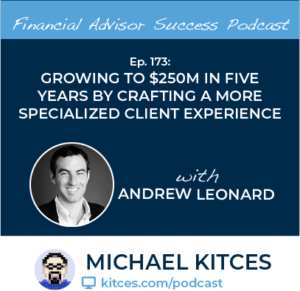Enjoy the current installment of "weekend reading for financial planners" – this week's edition kicks off with a new industry study from Broadridge finding that the coronavirus pandemic is just further accelerating the industry's shift towards more holistic financial planning as a way to demonstrate and add value in the midst of the turbulent market environment (particularly amongst advisors under age 40).
Also in the news this week is a new study finding that nearly 1/3rd of consumers still don't understand how financial advisors are compensated (undermining their trust in working with an advisor) and that getting a clear understanding of how the advisor is paid is even more important than the actual payment mechanism itself (e.g., commissions, AUM fees, fee-for-service, etc.), a discussion of whether advisors should be cutting fees in the current environment (particularly for their clients facing their own difficult financial situations), and the opportunity for advisors to work with their more affluent clients to make distributions from donor-advised funds to help charities that are trying to serve those most in need right now but may be struggling in the current environment.
From there, we have several articles on behavioral finance and helping clients through difficult environments, including tips on how to handle calls from clients who want to go to cash, how to (and how not to) position your 'behavioral coaching' as a value to clients and prospects, recent research showing that the more familiar an investor is with a stock, the more rapidly they tend to trade it (and the worse the results tend to be), an overview of the legal defensibility of various risk tolerance software tools (where some are far more robust than others if the advisor even had to defend their use of the tool in court), tips on what to look for (and what to avoid) in finding a valid and reliable risk tolerance assessment tool, and some guidance on what conversations to have with clients now while markets are calmer (to prepare for the possibility that they could become much more volatile again before the recession is over).
We wrap up with three interesting articles, all around the theme of how the industry itself is changing: the first looks at how in the last (financial) crisis, it was the firms that reinvested the most for growth despite the scary environment that ended out having the most success in the decade that followed; the second looks at the evolving trends in the industry that were already underway but may be accelerated by the coronavirus pandemic; and the last, a send-off from the soon-to-be-retiring Mark Tibergien, explores what financial advisors and the industry at large can do to make ourselves even more valuable in the aftermath of the coronavirus pandemic and the decade to come!
Enjoy the 'light' reading!

 Welcome back to the 174th episode of Financial Advisor Success Podcast!
Welcome back to the 174th episode of Financial Advisor Success Podcast! Welcome back to the 173rd episode of Financial Advisor Success Podcast!
Welcome back to the 173rd episode of Financial Advisor Success Podcast!
